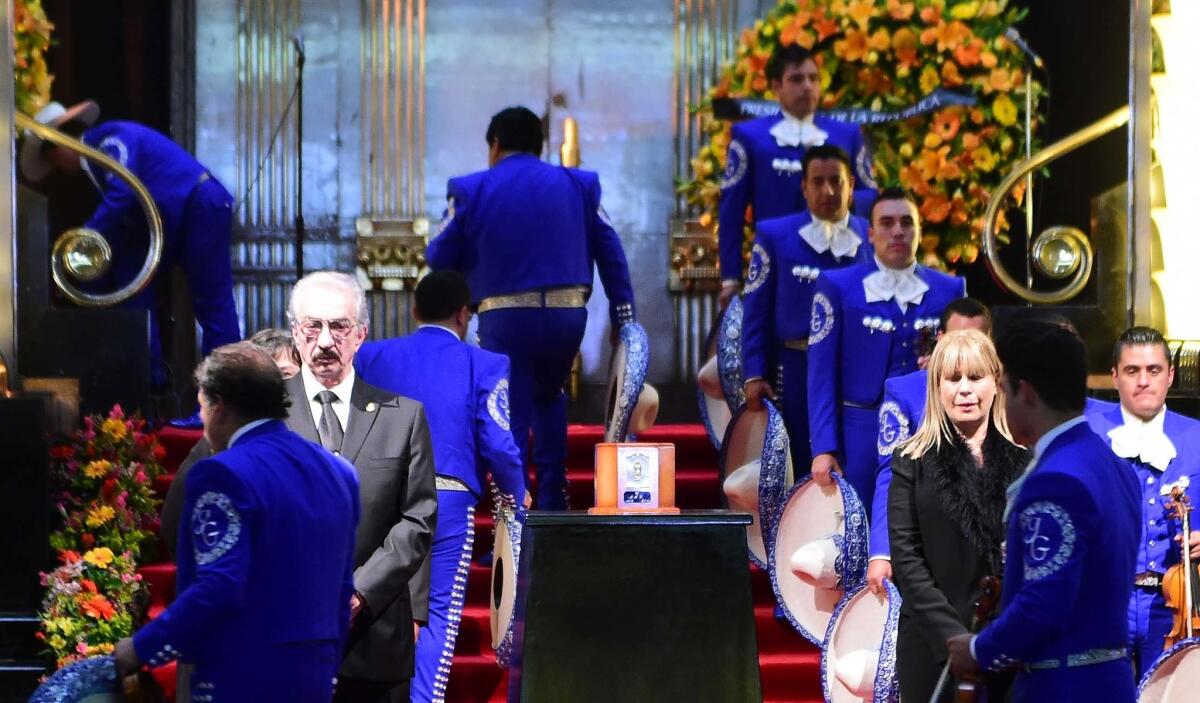Mexico mourns Juan Gabriel at the gilded theater where he once broke musical barriers

- Share via
Reporting from Mexico City — Ana Maria Beltran stood in the rain holding a single red rose.
It was for Juan Gabriel, the superstar singer, whose ashes arrived in Mexico City Monday for an elaborate two-day memorial befitting a pope or a head of state.
Government officials said they expect as many as 1 million people to pay their respects at the national theater, Palacio de Bellas Artes, where an urn containing the singer’s remains is on display.
Beltran, 76, was one of them. The flower she carried was a nod to her favorite Juan Gabriel song: “Esta Rosa Roja” (“This Red Rose”).
“He was a teacher for all of Mexico,” said Beltran, who said Juan Gabriel’s rousing ballads and motivational dance hits inspired all of Mexico, rich and poor, young and old.
“We all went to his school,” she said.
Many of the thousands of people lined up outside the theater Monday afternoon held photos of the singer or homemade signs that read “Rest in Peace.” Others strummed guitars, huddling together in the driving rain to sing Juan Gabriel songs.
Rodrigo Marin Mejia, 15, had written the words Amor Eterno (“Eternal Love”) on his cheek. That is the title of one of Juan Gabriel’s biggest hits.
“All Mexicans know the national anthem, las mañanitas [a traditional birthday song] and at least one song by Juan Gabriel,” said Marin, who had come with his twin sister.
“We heard his music since the day we were born,” he said. “He has left us, but thank god his songs are still here.”
The pomp and ceremony surrounding the memorial was fitting for a performer known for his exhilarating stage shows. Juan Gabriel often performed in sequined capes, and with armies of dancers and mariachi musicians. His shows lasted as long as five hours.
The singer, who had suffered health problems in the past, was in the middle of a U.S. tour when he suffered a fatal heart attack at his home in Santa Monica on Aug. 28. He was 66.
His ashes arrived in Juarez, the border city where he grew up, over the weekend. Tens of thousands of people greeted the hearse, which was festooned with more than 500 roses. A flock of white balloons was released into the sky.
The Mexican government flew Juan Gabriel’s remains to Mexico City on Monday, and closed several streets so his funeral procession could make its way quickly through the traffic-choked city.
The government’s Ministry of Culture organized a series of concerts to honor the singer, with stars including Pepe Aguilar and Ana Gabriel among the musicians scheduled to perform. They serenaded the small wooden box containing Juan Gabriel’s ashes as mourners filed past, many pausing to bless themselves with the sign of the cross.
Video of the procession was broadcast on giant outdoor screens set up in a neighboring park, where thousands of spectators watched. Officials said they were prepared to keep the theater open all night to accommodate everyone who wanted to pass through.
The display of Juan Gabriel’s ashes at the Palacio de Bellas Artes was significant on several levels. The art nouveau theater, whose golden dome is the crown jewel of downtown Mexico City, is where many national heroes have been memorialized.
Those honored here after their deaths include the writers Gabriel Garcia Marquez and Octavio Paz as well as the beloved Mexican actor Cantinflas.
The theater is also where Juan Gabriel broke musical barriers in 1990, when he became the first non-classical musician to perform there. A live album recorded that night became one of Juan Gabriel’s best-known records.
Isabel Olmos, 56, and her husband often watch a video recording of that performance. “He didn’t just sing his songs, he felt them,” Olmos said. “As a teenager I could barely afford to buy his records, but I was in love with him.”
The couple drove two hours to Mexico City on Monday to attend the memorial along with their young grandson, who loves Juan Gabriel’s songs so much that the family hired an impersonator to perform at his birthday.
Such impersonators are common in Mexico, where Juan Gabriel was more famous than Elvis. In a surreal touch, several impersonators were present at the memorial on Monday, posing for pictures with crowd members.
“It’s a gift from God to imitate him,” said Rey Rojas, 36, who wore a flashy, sequin-encrusted suit and his hair combed back into Juan Gabriel’s signature pompadour. He began performing Juan Gabriel songs at parties and nightclubs in Guadalajara at age 14. He said it felt like a piece of him died when he heard the bad news.
“I thought it was a cruel joke,” he said. “My life was Juan Gabriel.”
Later this week, after Mexico City has had its chance to mourn, Juan Gabriel’s ashes will be returned to Juarez, where his family members will pay their final respects.
His family says Juan Gabriel’s home there may be turned into a museum along the lines of Elvis Presley’s Graceland.
More to Read
Sign up for Essential California
The most important California stories and recommendations in your inbox every morning.
You may occasionally receive promotional content from the Los Angeles Times.











